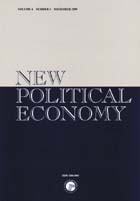Japan and World Order
"Japan and World Order", New Political Economy, Vol. 7, No. 3, (2002), pp. 397 - 414.
This material has been published in New Political Economy, Vol. 7, No. 3, (2002), pp. 397 - 414. The only definitive repository of the content that has been certified and accepted after peer review. Copyright and all rights therein are retained by Taylor & Francis. This material may not be copied or reposted without explicit permission. (Copyright (C) Taylor & Francis Ltd.). The download of the file(s) is intended for the User's personal and noncommercial use. Any other use of the download of the Work is strictly prohibited. By downloading the file(s), the User acknowledges and agrees to these terms. The web-site of the journal is located at http://www.tandf.co.uk
|
Abstract |
| Contemporary Japan is clearly displaying all the symptoms of a serious malaise. The economy shows no sign of emerging from its decade-long slump, the political system is bogged down in the mire of factional in-” ghting, the bureaucracy is seemingly inept and both politicians and bureaucrats have about them a whiff of corruption. As a consequence Japanese citizens are staying away in droves from retail outlets and voting booths alike. The short-term implications of this for the global economy are discussed almost daily in the quality press. These discussions suggest that the continued prostration of the Japanese economy can do nothing other than spell bad news for all of us, especially since the US economy has yet to show signs of a sustainable recovery following its flirtation with recession throughout 2001. This is well taken. What is also needed, however, is an analysis of the medium-to-long term implications for the global political economy of the changes underway within Japan. This article aims to do just that by assessing the contemporary condition of the Japanese political economy and by pointing to some of the implications of prolonged recession for the country and the regional and world orders of which it is such a vital part. In the round, the article suggests that the effects of continued Japanese misery will be felt the world over and will impact not only upon established economic structures and relationships but on political, social and strategic structures and relationships also. The argument unfolds in three stages. A brief section laying out the theoretical framework is followed by a survey of the nature and origins of the Japanese crisis, while the third section details the Japanese response and the impact this is already having on the world around it. |

